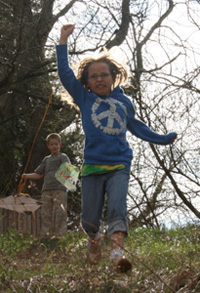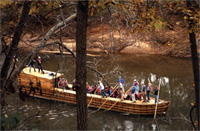Our Programs
Please note that our regular public programming has been suspended during construction of our new museum building. We will resume regular public programs as soon as the building is open. In the meantime, you may be interested in the special boat tours that are still available, described on the home page.
When visitors come to the current Lewis & Clark Exploratory Center, housed in the Keelboat Barn in Darden Towe Park, they encounter full-size replicas of all the different types of boat that Lewis and Clark travelled on  in the Expedition: the 55-ft. long Keelboat, the 42-ft. long Red Pirogue, the 39-ft. White Pirogue, as well as a Native American bull boat (made of buffalo hide and willow branches), and a dug out for children to work on.
in the Expedition: the 55-ft. long Keelboat, the 42-ft. long Red Pirogue, the 39-ft. White Pirogue, as well as a Native American bull boat (made of buffalo hide and willow branches), and a dug out for children to work on.
Red signs indicate hands-on working stations, for what has been described as an "activity cafeteria." We have "Art in Action" for mask making that teaches about North American animals, "Science Station" for bird activities and water studies, "Beading" with a Native American focus, and "Carpentry Corner" for projects such as nail art and bird houses. We have a Boatbuilder’s Apprentice Program where children learn to hammer, chisel, saw and drill.
Some activities remain constant, and others change. We have painting and oar smoothing and nature journaling. We lead scavenger hunts that teach the compass and the use of a hand-held GPS unit. For the Fourth of July we do red, white and blue printmaking, and in the fall we make leaf prints.
Boatbuilding has also been a traditional part of our program, and we invite older children to make their own  pirogues in special workshops. We also have a fleet of kayaks to get children out into nature, appreciating the wildlife and plants of the river. In addition, this year we have begun to explore folk art inspired by the 19th Century with such crafts as making checkerboards and farm animal portraits. This year too we created petroglyphs and we made our own compasses with needles and water.
pirogues in special workshops. We also have a fleet of kayaks to get children out into nature, appreciating the wildlife and plants of the river. In addition, this year we have begun to explore folk art inspired by the 19th Century with such crafts as making checkerboards and farm animal portraits. This year too we created petroglyphs and we made our own compasses with needles and water.
Our programs are continually evolving, but they always remain an exploration.
